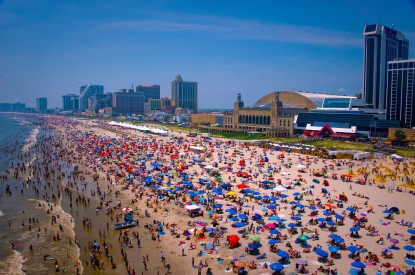Supplier News
US – Atlantic City is a destination in transition
By Phil - 11 July 2014
Atlantic City’s beach is busy, its Boardwalk is bustling, its nightclubs are buzzing, its restaurants are full and its stores are enjoying brisk sales. In short, it’s a typical summer day at the seaside resort.
Amid all the umbrellas in the sand and visitors strolling on the Boardwalk, the fact is that Atlantic City is a destination in transition.
Atlantic City, which used to be one of only two US jurisdictions with legalised casino gaming, is currently in the midst of an aggressive, multi-year effort to broaden its appeal among non-gamers. As gaming supply outstrips demand regionally and nationally, mature casino markets such as Atlantic City, Delaware, Pennsylvania, Connecticut and others are being impacted by the proliferation of casino gambling nationwide.
The glut of slot machines and table games recently led ratings agency Moody’s Investors Services Inc. to lower its outlook on the nation’s casino industry to “negative” from “stable.” Total domestic gaming revenue was down 1.8 percent in April and 0.8 percent in May for 15 of 18 jurisdictions that had released May results in time to be included in the Moody’s report.
Regionally, New Jersey, Delaware and Connecticut are facing significant competition from casinos in Pennsylvania, New York and Maryland.
“Consider that Atlantic City was host to nearly 39,000 slot positions in 2006,” said Atlantic City Mayor Don Guardian. “Pennsylvania, New York and Maryland have since nearly doubled the number of regional slot positions, adding 36,000 – with more to come. Fortunately, this trend of increased supply and competition isn’t a surprise to Atlantic City. We’re making significant progress in our transition to a destination that relies less on casino gambling and more on a comprehensive mix of attractions to draw tourists to the Jersey Shore.”
Tourism is the third most important industry in the state of New Jersey. Atlantic County represents 20 percent of the Garden State’s tourism industry, with Atlantic City serving as the single most significant contributor. At the same time that the local casino industry is necessarily contracting in response to regional and national gaming saturation, Atlantic City is seeing significant growth in other critical sectors, including dining, entertainment and retail.
“In Atlantic County, non-gaming revenues have increased by $240m, from $4.72bn in 2010 to $4.96bn in 2013,” said Casino Reinvestment Development Authority (CRDA) Executive Director John Palmieri. “Within Atlantic City, non-gaming revenues have increased by more than $160m in just the last two years and are now approaching $1bn annually.”
The CRDA has attracted more than $700m in capital investment, with more than $290m in process, to continue to grow the market’s non-gaming amenities, Mr. Palmieri said.
Another indicator of the growth in entertainment spending is represented by the luxury tax receipts – taxes on alcoholic beverage, tickets and other amusement attractions.
In the first quarters of 2011, 2012 and 2013, these receipts averaged 20.7 per cent higher than the four-year average from 2007 to 2010, growing from $5.6m quarterly to $6.8m. On the same basis, second quarter receipts were 33.1 per cent higher, third quarter receipts were 20.8 percent higher and fourth quarter receipts were 20.2 per cent higher.
Atlantic County’s retail sector has expanded over the past three years, with 2013 retail wages and salaries increasing 8.1 per cent relative to 2010, from $381.9m to $412.9m. Wages at full-service restaurants in Atlantic County reached estimated 2013 levels that were 28.3 percent ahead of 2010 — $128.1m to $164.3m– and bars were 42.7 per cent ahead ($12.8m to $18.3m).
The influx of visitors seeking a leisure getaway has been fuelled by an innovative mix of special events, new attractions and modern facilities, said Atlantic City Alliance CEO Liza Cartmell.
“We’re proud to host A-list performers such as Lady Gaga, who did a sold-out show at Boardwalk Hall earlier this summer, and feature top-flight entertainers in free concerts on our magnificent beach,” she added. “We just concluded the Sand Sculpting World Cup and look forward to welcoming AVP pro beach volleyball back to Atlantic City in the months to come.”
In addition to broadening its appeal among tourists, Atlantic City is positioning itself for considerable growth in the meetings and conventions space. Caesars Entertainment, the largest casino operator in Atlantic City, is investing $126m in a new, state-of-the-art convention center at its Harrah’s property in the Marina District.
Since 2009, group bookings at the core group travel properties has grown from 274,000 room nights to more than 361,000 room nights – an increase of more than 22 per cent. Atlantic City currently owns just about 6 percent of room nights used for group business whereas regional convention and meetings hotels currently run at roughly 25 percent, providing the destination significant opportunity to grow its convention nights moving forward.
In 2014, the Casino Reinvestment Development Authority selected Global Spectrum to manage the Atlantic City Convention Center and Historic Boardwalk Hall. The CRDA also authorized the creation of a new convention sales organisation, called Meet AC, to be laser focused on building the group, meeting and convention business.
“Atlantic City’s revitalisation won’t happen overnight, but as we continue to diversify our offerings, attract new investment, maximize our material assets and identify new and innovative ways to promote our differentiating characteristics, Atlantic City will grow stronger and stand taller for having experienced its recent challenges,” Mr. Guardian said.


